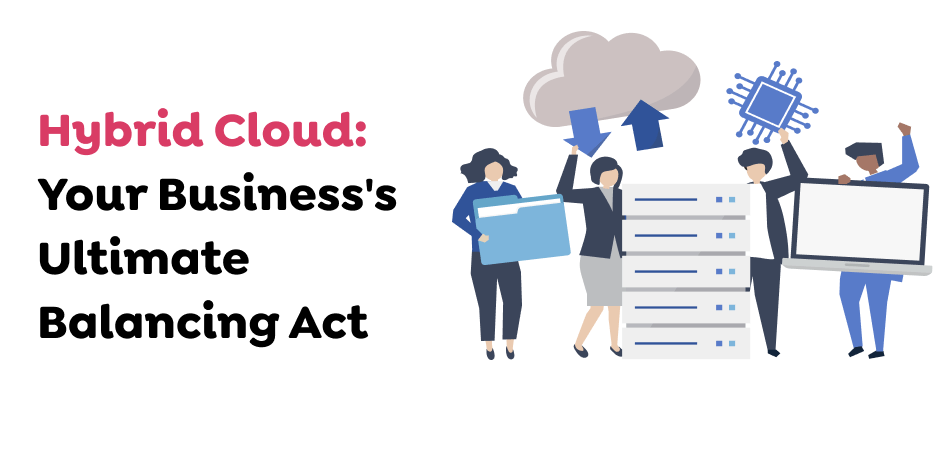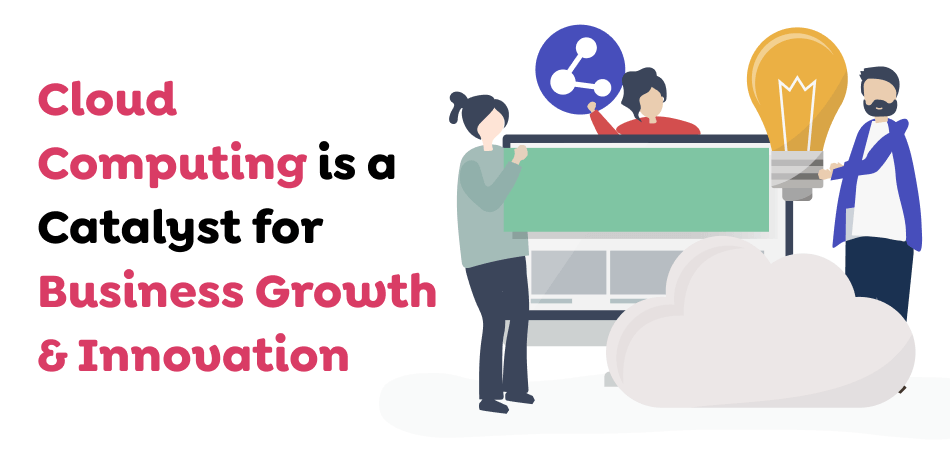Write Us
We are just a call away
[ LET’S TALK AI ]
X
Discover AI-
Powered Solutions
Get ready to explore cutting-edge AI technologies that can transform your workflow!


Cloud computing is now a standard in the business world, with benefits ranging from improved effectiveness and better customer services to a more competitive edge in the fast-paced technological world. Know about the cloud computing benefits for businesses and how training in this field is crucial for technological innovation.
On a broader scale, the widespread use of cloud-based Software has given our economy a total productivity boost of $9.4 billion over the last half-decade, with about 42% of businesses employing a cloud service paid for. Although the software industry continues to grow, inadequate understanding of the Software is the main obstacle to acceptance. People who want to transform their business processes using cloud computing benefit from the myriad ways it promotes innovation and flexibility, which we’ll explore in the following article.
Cloud computing can be described as a groundbreaking technology that provides computing services such as databases, storage and servers, networking, analytics software, and more on the Internet. The technology lets users access and use computing applications and resources remotely without hardware or local infrastructure.
Also Read – Navigating the Impact of IoT & Cloud Computing on Modern Technology
Cloud computing benefits users to quickly set up and expand resources anytime and pay only for necessary resources. Accessing resources on demand gives users unprecedented flexibility, flexibility, and efficiency, allowing companies to be innovative, expand, and change business demands easily.

Cloud adoption is moving to cloud computing or implementing it within an organization. It could involve transitioning from on-premises infrastructures to the cloud or using cloud computing as an alternative to the infrastructure on-premises. Here are some examples of organizations that might make the switch to cloud computing:
Also Read – Multi Cloud vs Hybrid Cloud: Selecting the Appropriate Cloud Architecture for Your Business
Cloud adoption involves using cloud-based infrastructure, such as storage, servers, and networking, to host workloads and applications. A good example is a company that utilizes Amazon Web Services (AWS) to host its website.
This is a cloud-based adoption based on platforms like Heroku or Azure for developing and deploying applications. One example is an organization that utilizes PaaS to develop and launch a modern customer relations management (CRM) system.
This type of cloud-based adoption involves using cloud-based Software like Google Workspace or Salesforce. A good example could be an organization that switches from Microsoft Office to Google Workspace to meet its productivity requirements.
This cloud deployment involves the combination of on-premises infrastructure and cloud-based services. A good example is a company that uses on-premises servers to run specific tasks, such as their listing software. However, it utilizes cloud-based services to handle other applications, such as its CRM software.
Cloud computing providers are expanding the number and scope of services they offer through the cloud, and well-known public cloud platforms like Amazon Web Services, Microsoft Azure, and Google Cloud Platform are becoming more sought-after than ever before.
Whatever the size, most organizations are using cloud technology in one way or another. Cloud computing adoption in businesses’ approach to increase their ability to scale their internet-based database capabilities while cutting costs and risks. There are many advantages to using this technology. In the past few years, cloud technology has become an essential element of every sector and organization. Catalyzing expansion, the cloud model has revolutionized how companies run their businesses.
Also Read – Cloud Application Security: Best Practices To follow !
Cloud computing companies are expanding the range and variety of services they provide through the cloud, and well-known public cloud platforms like Amazon Web Services, Microsoft Azure, and Google Cloud Platform are becoming more sought-after than ever before.
No matter the size, many companies today are using cloud technology in some form or another. While the cloud adoption approach is typically used by businesses to enhance the scalability and capacity of their databases based on Internet capabilities while also decreasing risk and costs, there are many additional benefits to this technology.

According to various research and reports according to multiple reports and surveys, the market for cloud computing will be worth $2,974.6 Billion by 2033, up from 629.5 billion in 2023 with an annual compound rate of growth (CAGR) in the range of 16.8% between 2024 and 2033.
In 2023, the Software as a Service (SaaS) segment surpassed the status as the market leader, claiming the largest share of revenue, 55.8 percent. Private cloud also was dominant, taking the largest share of revenue, 43.1 percent.
Among the different sizes of businesses, large enterprises dominated the market, earning the highest revenue share at 59.0 percent. Within the various industries that are categorized, the BFSI segment stood out with the highest revenue share at 21.5 percent. Regarding geography, North America emerged as the most dominant player within the Global Cloud Computing Market, having a large profit share of 39.3 percent in 2023.
In addition, cloud computing is divided into Software as a service (SaaS), infrastructure as a service (IaaS), and platform as a service (PaaS). In the IaaS, PaaS, and SaaS groups, Software as a Service (SaaS) has emerged as the most dominant, claiming the highest revenue percentage of 55.8 percent by 2023.
This is due to the ease of use and access to SaaS solutions. SaaS solutions provide companies with the latest applications without the nuisance of managing complex hardware and software configurations.
Cloud deployment includes three distinct segments: Hybrid Cloud, Private Cloud, and Public Cloud. Of the three categories, the private cloud generated the most revenue, 43.1 percent in 2023.
It was a significant competitor to other forms of cloud computing since it was devoted to one particular organization and provided enhanced security and control features, offering greater privacy and security.
If we look at industrial adoption, the BFSI segment accounted for a substantial percentage of revenue, 21.5 percent in 2023. Cloud computing is driving development in the Fintech industry, Banking, Financial Services, and Insurance companies’ expansion and revenue. The industry handles sensitive information and requires massive storage capacity to run daily operations.
In addition, cloud computing is used in healthcare, retail, media, telecommunications, and various other industries for end-users, which helps businesses and organizations grow in a competitive market.

The diagram illustrates how a hybrid cloud works in which the Public Cloud and Private Cloud are connected via Data & Connection, showcasing one of the different types of cloud computing on demand. The cloud has three deployment options: public, private, and hybrid. Every model lets users access their files and applications at any time, from anywhere; however, they differ in how they approach this. The best choice for your company depends on factors such as your cloud use, data rules, and other aspects.
Public Cloud services have changed the way we can access online resources. Instead of using costly private clouds to create and maintain for a single organization, cloud services are managed by third-party service providers, which provide a cost-effective solution.
In cloud services, you only pay for the services you use, which makes it scalable and cost-effective. While private clouds are essential for businesses that have strict requirements for data privacy and requirements for data privacy, public clouds are the best choice for companies that can scale and reduce their workload without significant initial investments.
Private Cloud solutions offer organizations more control, customization, and protection. In contrast to public clouds, which focus on efficiency and accessibility to the Internet, private clouds provide exclusive space. The data you store there stays secure and in compliance with the rules. This is perfect for companies with sensitive data or business-specific needs.
With a private cloud, you can handle your IT infrastructure the way you’d like, providing greater flexibility and safety. It’s like having a private security fortress for your data, making sure it’s safe and allowing your business to operate efficiently and securely.
Hybrid Cloud is an innovative solution that combines the most effective features of both private and public cloud providers. It provides businesses with the benefits of cloud services, including scalability and cost-efficiency, but also the security and controls inherent in private cloud systems. This method is especially beneficial in industries governed by strict privacy laws.
Consider, for instance, the scenario where sensitive information is secured on a private cloud but is accessible through apps that are hosted on a cloud. With a hybrid cloud configuration, businesses can benefit from cloud-based CRM systems while ensuring that regulated data remains safe in a secure, private cloud. The flexibility of the hybrid cloud positions it as the best option for companies seeking harmony between cloud accessibility and security.

Here’s a list that outlines the advantages an organization can anticipate to gain from adopting cloud infrastructure.
The capability to create fresh cloud computing applications in mere seconds has changed the speed and efficiency of development. Developers can quickly explore new ideas and develop applications without relying on hardware limitations at the site or slow procurement processes.
Continuous integration and continuous delivery are based on the reality that the latest software development can be quickly tested and then deployed into the cloud environment. This permits faster product development and releases new features to users regularly, on a weekly, monthly, and, in some cases, even daily basis. Cloud environments can also be integrated with standard DevOps software and log systems, which makes it easier to track and identify issues that occur in production.
With cloud-based infrastructure, you will only need to invest a small amount of money in buying and maintaining equipment. This dramatically decreases CAPEX costs and Total Cost of Ownership (TCO). Spending money on infrastructure, equipment, utilities, or even building an enormous data center to expand your company is unnecessary.
There is no need for massive IT teams to manage the operations of your cloud data center in the sense that you can benefit from the skills of the cloud provider’s personnel. Cloud systems also reduce costs due to downtime. Because downtime is extremely rare in cloud-based systems, you won’t need to spend time or money fixing any issues that could be related to downtime.
One of the biggest issues for every company, regardless of size or industry, is protecting its data. Cybercrimes and data breaches can ruin a company’s revenues, customer loyalty, and branding. Cloud has a range of cybersecurity features to ensure that the data is safe to be stored and processed. Features such as granular permissions and access management using federated roles allow access to sensitive information only to those employees who need access to it. It also does, making it less of a target for attackers.
Cloud storage providers provide basic security measures for their platforms and the data they store, including access control, authentication, and encryption. Many businesses supplement these safeguards with additional security measures to protect cloud data and restrict access to sensitive data on cloud storage.
Different businesses have different IT requirements. A massive enterprise with more than 1000 employees may have different requirements of a startup. Cloud consulting services is a terrific option since it allows businesses to effectively and swiftly increase or decrease the size of their IT departments to meet business needs. Cloud-based solutions are great for companies with increasing or changing bandwidth requirements. If your company’s demands grow, you can easily increase the capacity of your cloud without the need to purchase physical infrastructure. This kind of flexibility could give companies using cloud computing benefits over other businesses.
This flexibility reduces the risks of in-house operational problems and maintenance. Cloud computing uses high-performance resources with professional solutions that require no upfront investment. Scalability is the most likely benefit of cloud services.
Cloud environments facilitate greater collaboration between teams like QA engineers, developers operations, security, and product architects. They are linked to the same system and can work together without stepping into each other’s shoes. Roles and authorizations for cloud environments provide better monitoring and visibility on who was doing what and when to avoid confusion and conflicts. Cloud environments can be created to serve specific needs, such as staging demonstrations, QA, or pre-production. It’s much simpler to work more transparently, and the cloud supports it.
As a result of the scalability benefits mentioned above, the cloud offers the capacity to store all kinds of data within different cloud storage types based on the availability of the data, its performance, and the frequency at which the data needs to be accessed.
The standard is that the storage price will increase in proportion to the accessibility of data, its performance, and the frequency at which access is made. Enhancing your cloud’s cost structure can dramatically lower the cost of cloud storage while still achieving the company’s objectives about data storage within the cloud.
The probability of data being saved in cloud storage with no capacity restrictions also assists with the backup and restore process. Because end users’ information alters over time and has to be monitored to comply with regulations or compliance reasons, old versions of Software can be saved for later times when they will be required for recovery or rollback.
The earlier versions of Software saved in the cloud and the ability to run production instances across multiple cloud regions or availability zones allow faster recovery from catastrophes. Suppose your application is installed in multiple locations, and one of them is affected for reasons beyond your control. In that case, the application will be automatically switched to working regions with no interruptions for users. If the software version has a severe flaw, an immediate rollback is started to restore an earlier released, stable version to minimize the damage.
Cloud computing offers mobile access to corporate information via smartphones and other devices. This is an excellent option for ensuring that nobody is removed from the conversation. People with busy schedules or who reside some distance from the office can benefit from this feature to stay current with coworkers and clients.
Cloud-based resources can be stored easily, retrieved, retrieved, or processed with a few clicks. Users can access their work on the go, at any time, on any device they prefer, and in any part of the world so long as they remain in touch with the web. In addition, every upgrade and update is entirely automatic, without the need for service providers. This reduces the team’s time and effort when managing the systems, greatly decreasing the workload of IT staff.
Information loss and data security are enormous issues for every organization. Storing data in the cloud ensures that it will always be accessible, even if your devices, such as computers or laptops, are damaged. Cloud-based services also offer quick data recovery in various emergencies, ranging from natural disasters to power outages.
Cloud infrastructure also helps you prevent loss. If you are using traditional on-premises solutions, your data will be saved locally on the office computer. Despite all your efforts, computers may fail for many reasons, from viruses and malware to the deterioration of hardware due to age or a simple user error.
However, if you transfer your files to the cloud, they will be accessible to any computer with the Internet key, regardless of whether the computer you work on has a problem.
Controlling sensitive information is essential for any business. You don’t know what might occur if your data falls into the wrong hands, even if it’s the fingers of an untrained employee. Cloud gives you complete control and visibility of your data. It is easy to determine which users are granted access to which data. This allows you to control access; however, it also simplifies tasks since employees will understand what documents are given to them. This can also boost collaboration efficiency. Because multiple individuals could rework a single document copy, there is no need to keep duplicates of the same document available for circulation.
Only some businesses will move to cloud consulting services, at least not now. However, companies that switch to the cloud realize the benefits it can bring their business.
The adoption of cloud services is increasing each year as businesses realize they can gain access to top-of-the-line enterprise technology. If you implement cloud-based solutions now, you’ll have a head start on your competition.

The cloud computing revolution has carried the business world by storm, changing how businesses operate and flourish. Utilizing robust networks and resources on-demand, cloud computing provides a revolutionary solution to improve the company’s efficiency. Let’s look at the main advantages:
Let’s look at how well-designed cloud computing can improve the efficiency of your business.
No more are the days of rigid infrastructures. Cloud computing allows companies to increase or decrease their capacity according to their customers’ needs. You don’t need to make substantial upfront investments or excessive provisioning—modify your subscription per your needs. This flexibility lets companies promptly adjust to market changes and seize new opportunities.
Cloud computing functions as an engine of digital transformation, seamlessly connecting to existing processes or generating the power for entire cloud-based services. With the right partners in cloud computing, the migration process can be smooth and easy, eliminating the risk of costly delays or data risks. Every company will eventually have to adopt the latest technology, and cloud computing benefits can provide an easy path.
Get rid of clunky software updates and IT-related issues. Cloud platforms take care of security and maintenance, while your team members have instant access to their data and applications on any device anywhere around the globe. This allows for seamless collaboration, increases productivity, and gives remote workers. Collaboration becomes easy if it’s a UI/UX group or a marketing department with a global reach.
Your data is your most valuable asset, and the cloud helps keep it safe. With safe storage and backup systems built in, you can access your data whenever you want via any device, ensuring business continuity even in unplanned situations. Automated encryption is a further layer of security, giving you peace of mind.
Pay for something other than expensive hardware or purchase of Software. Cloud computing uses a pay-as-you-go pay-as-you-go model, which reduces upfront costs and makes it possible to avoid unnecessary fees when you scale down. It only charges for services you use, which makes it an economical solution for transforming businesses of any size.
Your team can deliver customer service by providing instant access to data and communicating with customers through various devices. Automated self-service solutions and omnichannel assistance further improve operations and increase customer satisfaction.
With the burden of operational management lifted, firms can focus on the innovations that drive growth. Cloud computing offers the flexibility and capacity to test, create new ideas, and remain ahead of the game. Continuous innovation is not only possible but promoted in the cloud-based environment.
The journey to cloud computing begins with awareness of its enormous potential to improve business efficiency. From increased efficiency and collaboration to cost-savings and innovation, its benefits are unquestionable. Take the first step toward change and discover the benefits of cloud computing that can unleash your company’s full potential.

The rapid growth of cloud computing is undisputed. The cloud computing benefits have revolutionized how we work, providing enterprises with a powerful toolbox to improve their operations, cut expenses, boost agility, and boost innovation. If you haven’t yet moved into cloud computing, it’s now. With its numerous benefits and the possibility of conquering its obstacles, adopting a cloud-first method is easier and more cost-effective than it has ever been.
Cloud computing isn’t just an occasional trend. It’s the future of business operations and a game changer in this digital age. The significance and expansion of this technology will only increase in the future, opening the way to improved efficiency, productivity, and growth for businesses.
Techugo, a leading cloud solutions provider, can be your trusted partner in this digital transformation journey. With our expertise in cloud strategy, implementation, and management, we can help you harness the full potential of cloud computing. From selecting the right cloud platform to optimizing your cloud environment, Techugo offers comprehensive solutions tailored to your specific business needs. Contact us and we can guide you toward a cloud-powered future where innovation thrives and efficiency soars.
Write Us
sales@techugo.comOr fill this form